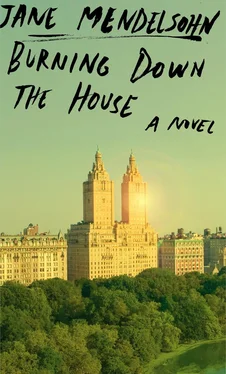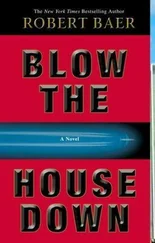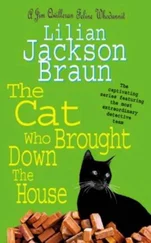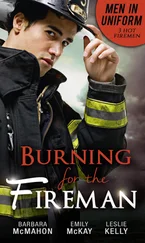—
The corner of the towel drooping, careless, nonchalant. She wants to pull it, rip it out, like ripping out his tongue.
—
Poppy did not succeed in getting a rise out of Ian at that moment, but her jealousy was duly noted, and it changed things. She had never known her father and been orphaned at six, but there wasn’t much for which she had had to fight: she had grown up with marble foyers and private chefs, attentive teachers and other perks of being rich that seemed, from very far away, to make up for a grossly dysfunctional family. Now, for the first time, the instinct that had made her clench her fists while she slept, the impulse that had led her to be fiercely independent and appear aloof and eccentric to her peers, was manifesting itself with a purpose. Possessiveness matured her and gave her definition. It brought out her true nature, her terrible longing and submerged rage. It heightened everything about Poppy: her angled face, her knowing naïveté, her sarcastic smile and adorable wit. Her careless, fearless, superbly plain sense of style and ravishing big eyes. And the womanliness it graced her with caught Ian’s attention and made him, finally, begin to love her.
—
Where are we going? she asked.
To a movie, he said.
To a movie? In a movie theater? Really?
What? Is that so crazy?
Can’t we just watch something at your place?
No, we’re seeing an old movie. A real film. And it would be sacrilegious not to see it in a theater.
Okay, if you say so, Grandpa.
Look, I’m proud that I was formed by the twentieth century. No Internet, no texting, no cyberbullies. We had art. We had live, communal experiences.
People tweet while they watch TV, you know, Poppy said, knowing this would drive him crazy.
Oh Jesus, he said, smiling wildly, and took her by the hand.
They were running across Houston Street. The Saturday after Thanksgiving and the day ending so early it felt like what she imagined it might feel like in Sweden. A blue, crisp holiday air and a vibration of excitement, the intersection of urban consumerist buzz and genuine social well-being, people looking one another in the face if not the eyes along the sidewalks, bustling families and children in parkas that left their arms puffed out at an angle as if they were ginger-cookie people, little happy robots breathing in the brisk New York City climate that changed block to block, but that was on this evening maintaining a steady supply of wintertime cheer, fellow feeling, camaraderie among strangers, something akin to joy.
He took her to see L’Atalante, by Jean Vigo, at the Film Forum. Ian held Poppy in the darkness and she thought it was the most beautiful movie, the most beautiful day of her life. When the skipper dove underwater and imagined that he saw his wife circling, circling with one arm curved loosely above her head, her white dress shimmering, Poppy felt a wave of pleasure wash over her as if she herself were underwater, circling, circling. It was warm and cool under the water, fast and slow. Temperature and time floated away, melted, disappeared. Only being was left, being and circling in the water.
—
The love they share is an attempt to express the inexpressible. There is no word for what they have, who they become when they are together. It is theirs and they belong to it.
—
Alix invited Ian, as usual, to the family’s holiday party at Steve and Patrizia’s apartment and of course Poppy was there, bantering with Steve’s business associates, flirting with the bartender, swiping canapés from silver trays with a sophisticated, practiced touch. The tables bulged with arrangements of fruit and ornaments, pale green grapes and pears and orbs made of glass, and burnished, dusky-gold garlands running the lengths of the tablecloths and slipping their thick dark leaves and glinting metallic beads in between plates of smoked salmon, sliced steak, bowls of brioche rolls, sourdough rolls with olives and rosemary, and wheat rolls with raisins and hazelnuts. Who spent time thinking up so many different kinds of rolls?
Poppy was sitting now on a long, low oyster velvet-covered couch and Ian watched from a careful distance as she talked to Felix. Felix stood by the couch, neither comfortable nor uncomfortable, at peace in his trousers and leather shoes and jacket and the bow tie that he had insisted on wearing in spite of Patrizia and Roman’s objections. Ian could see the way Poppy treated Felix with graceful kindness, a reverence that she reserved for very few people. She looked at him thoughtfully, patiently, recognizing his complex inner life and dignifying what others might have deemed his eccentricities by listening to him, answering his questions, allowing his truthful eyes to rest on her.
Later, when Felix had gone to sleep and Poppy and Ian were seated on a different couch, this one a chesterfield upholstered in sovereign blue, having been unable to avoid each other for an entire evening, the two of them balanced dessert plates on their laps amid a large group engaged in conversation about sports, politics, technology, and television. At first, Ian had thought of offering his opinion on a recent political scandal but the actual idea dissolved in his brain and he found himself unable to understand why anyone would care about the incident. Similarly, Poppy considered proffering her thoughts on the latest hot movie star and whether he was hotter or less hot than another hot actor but as she was opening her mouth it occurred to her that she was completely uninterested in the subject. In keeping the nature of their relationship a secret, she and Ian were carrying on their own private conversation, not spoken but some internal communication that heightened the energy connecting them and kept them close. Joyful, afraid, joyfully afraid, they sat at either end of the long sofa, smiling at other people, pretending to listen, nibbling at their ganache, falling more and more in love.

SO IT REALLY WAS a tragedy when the housekeeper told Jonathan about the receipts and souvenirs and Jonathan told Steve about Poppy’s affair with Ian and Steve told Ian that he, Ian, was Poppy’s biological father. Steve was a ferociously intelligent self-made mogul who had scaled the sheer-glass mountainsides of the international real estate community to become a member of the planetary elite. He was sixty-two, and he was wearing a bespoke suit on his large, unmuscular frame. He stood up and took his jacket off, hanging it carefully on the back of his chrome-and-leather chair, and walked around his desk to position himself, as he rolled up his shirtsleeves, to sit, just barely, on the front of the desk, looking down at Ian. After explaining to him how he knew that Ian was Poppy’s father and that he wanted Ian to never tell Poppy of this relationship, because, of course, as Ian would agree, such knowledge would be devastating to her, Steve insisted, effectively, that Ian sign a confidentiality agreement. Therefore, in spite of Ian’s feelings for Poppy, in spite of his stunned recognition that he was facing, for the first time in his life, a moral dilemma — the kind of thing that in his mind only occurred in screenplays and nineteenth-century novels — in spite of his idea of himself as a good and relatively speaking noble person, when Ian broke up with Poppy and hurt her more than she could possibly understand, he was not legally permitted to tell her why.
IAN HAD FIRST met Steve over twenty years ago, when Ian and Alix were freshmen in college, but he had never in all those years received a phone call from him. Who knows how long Steve had been waiting to make the call, but on that particular day Ian answered his cell, arrived shortly thereafter on a high floor of a building in Rockefeller Center, and, after walking down the gleaming corridor lined with modern art as violently and visibly expensive as if it had been painted in blood brushed on with thousand-dollar bills, learned from Steve that he, Ian, was Poppy’s biological father.
Читать дальше













